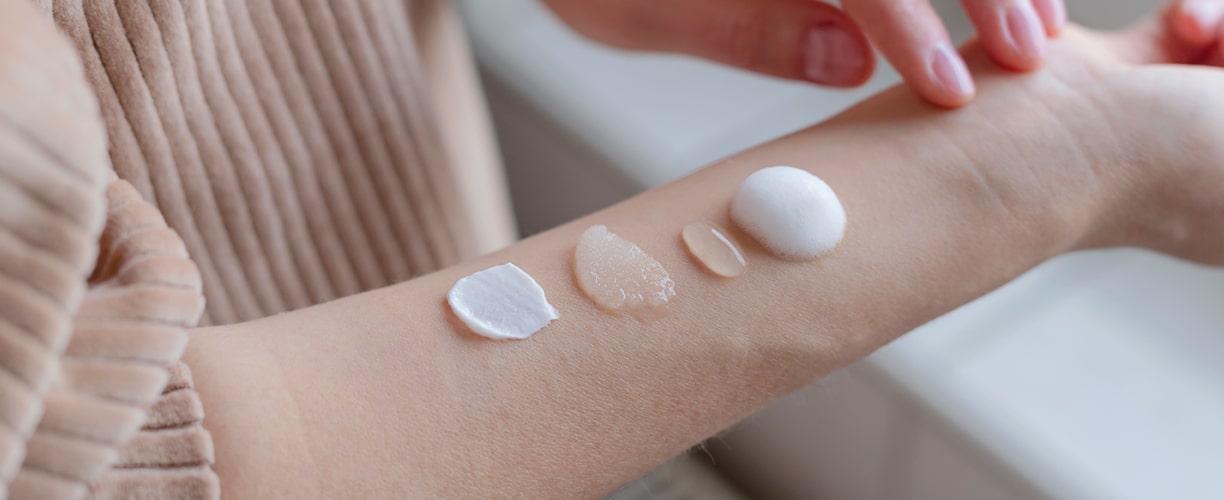Body Lotion vs Moisturizer: Best Uses, Tips & Skincare Guide

When it comes to skincare, the debate on body lotion vs moisturizer can be confusing for many. Keeping your skin hydrated is crucial, but understanding and following what goes with it is complicated.
Body lotion and moisturizer are a few terms used interchangeably, but their purposes differ. While both aim to achieve the same underlying purpose of nourishing and moisturizing, they differ in formulation, texture, and the body area they’re applied to. Such confusion could lead you to use an inappropriate product for your skin type or concern.
In this guide, we define the difference between body lotion vs moisturizer and explain how, when, and where to use each, depending on skin type, climate, and skincare goals.
 What Is a Moisturizer?
What Is a Moisturizer?
Face moisturizers are skin care products that hydrate and help the skin prevent moisture loss. They contain the three basic components:
- Humectants (such as glycerin, hyaluronic acid) that absorb water into the skin.
- Emollients (such as shea butter, squalane) that smooth over and soften skin texture.
- Occlusives (such as petrolatum, dimethicone) that form a seal to keep moisture absorption out.
Moisturizers maintain skin softness by drawing water in and trapping it inside. Most effective for dry, dehydrated, sensitive, or combination skin types, the best moisturizers for dry cold weather can also benefit all skin types, including oily ones.
 Types of Moisturizers
Types of Moisturizers
Here are the various types of moisturizers and which skin types suit them best:
Creams: Thick, rich, and very hydrating for dry or mature skin that needs deep moisture.
Gels: Gels are the best moisturizer for oily skin as they are lightweight and rapidly absorbed, making them suitable for oily and acne-prone skin.
Serums: Concentrated formulas containing active ingredients are the best moisturizer for aging skin and are suitable for all skin types.
Ointments: These are heavy and greasy, the best moisturizer for dry skin, typically in cold climates and sensitive spots.
What Is a Body Lotion?
Body lotion is a skincare formulation that contains a lot of water and is very thin compared to creams and moisturizers. It targets body skin, replenishing moisture, providing a smooth finish to rough patches, and maintaining softness. It is used daily after showering, when skin is damp, or in dry weather, and the lotion for dry skin rapidly absorbs into the skin, giving it a fresh feel and a comfortable sensation.
Who Should Use Body Lotion?
A body lotion will benefit dry and sensitive skin by restoring moisture while soothing irritation and skin barriers. Added ingredients such as shea butter, glycerin, and oatmeal relieve tension caused by tightness, flaking, and itching.
As we age, the skin naturally loses moisture and elasticity, making it necessary to use body lotion daily to remain soft and supple. However, with lifestyle factors such as constant showers, sun exposure, pollution exposure, indoor heating, or cooling working against the skin, a simple body lotion application is the key to maintaining skin in top condition.
Body Lotion vs Moisturizer
The key differences of body lotion vs moisturizers are listed below:
Texture:
Moisturizer: Usually thick or gel-like, for the delicate facial skin.
Body Lotion: Less viscous, can be applied smoothly over larger areas.
Targeted Areas:
Moisturizer: The face.
Body Lotion: The body (arms, legs, torso, etc.)
Hydration Level:
Moisturizer: Deeper hydration with active ingredients.
Body Lotion: Surface moisture with somewhere nice for everyday use.
Ingredients:
Moisturizer: Anti-aging actives, SPF, or acne-fighting agents.
Body Lotion: Soothing agents like aloe, cocoa butter, or oatmeal.
Best Application Timing:
Moisturizer: After cleansing, morning and night.
Body Lotion: Just after a shower, put on damp skin so it absorbs better.
Can You Use Body Lotion on Face?
A quick comparison of body lotion vs moisturizer is crucial to make an informed choice.
Moisturizer (for Face)
Pros:
- Has a light formulation for delicate facial skin.
- Targets individual concerns (anti-aging, acne, or hydration).
Cons:
- If not suited for your skin type, it may cause breakouts.
- It can feel heavy on oily skin types.
Risks:
Fragrance or active compounds may irritate sensitive or acne-prone skin.
Dermatologist Tip:
Choose non-comedogenic, fragrance-free moisturizers like CeraVe moisturizer to use daily.
Body Lotion
Pros:
- It covers larger areas and hydrates dry and rough skin.
- It might be soothing with ingredients like aloe or oatmeal.
Cons:
- Too heavy for the face.
- May contain added fragrance or alcohol.
Risks:
Itching or redness in sensitive skin, or right after shaving.
Dermatologist Tip:
Use a moisturizing product, such as Nivea body lotion or Vaseline lotion, while the skin is still damp, right after showering, to help lock in moisture.
Choose Between Body Lotion and Moisturizer
Choosing between body lotion vs moisturizer depends on various factors, such as skin type, climate, and preferences.
Skin Type:
Choose the product depending on how your skin behaves each day. If you have oily skin, use lighter moisturizers or non-comedogenic lotions that don’t clog pores. Dry skin needs something a little heavier, with creams full of shea butter or hyaluronic acid. Try balancing moisturizers that hydrate for combination skin without being too heavy or greasy.
Climate:
Your skincare needs change with the season. In the summer, choose light lotions with quick absorption to keep your skin hydrated without a sticky feeling from humid weather. In the winter, go for thicker products that prevent dryness caused by cold air and indoor heating.
Skincare Goals:
For anti-aging, opt for moisturizer ingredients such as peptides or retinol. For deep hydration, look for glycerin, ceramides, or hyaluronic acid. Oil-free, non-comedogenic products should be on your list to prevent acne. These products will soothe and repair the skin without causing breakouts.
Tips for Skincare Routine Integration
Here are the tips on understanding body lotion vs moisturizer application correctly:
How to Apply Moisturizer
- Cleanse first: Always apply it on a clear face. Use a gentle cleanser.
- Apply toner/serum (if needed): If they are part of your routine, apply toner/serum before the moisturizer.
- Apply moisturizer correctly: After lighter products like serums, but before sunscreen (in the morning).
- How much to use: A pea-size amount is usually good for the whole face.
- Pat down: Pat into skin or gently rub, do not go in with harsh rubbing motions.
- Extra attention: Dry zones like cheeks or around the nose can be given a little extra attention.
How to Apply Body Lotion
- Apply after shower: The best time to apply lotion is while skin is still slightly damp to lock in moisture.
- Start small: Use quarter-sized amounts for each body part (arms, legs, etc.).
- Warm it: Warm the lotion in your palms before applying it for even distribution.
- Massage it: Use circular motions to promote absorption and blood flow.
Best-Selling Body Lotions & Moisturizers at Eshaistic
Here we have a list of the top product recommendations from our brand:
This lotion is very light with a soft scent. It hydrates the skin for long hours, creating a smooth, healthy look.
Gentle and nourishing, this balm is for sensitive skin and provides deep moisture with calming, natural ingredients.
Shop Eshaistic Skincare Collection
Achieve glowy and healthy skin with Eshaistic’s exclusive skincare line. From gentle cleaning agents that nourish the skin to serums and treatments that fix problems, all are designed to enhance your natural glow. Shop now and give your skin the treatment it deserves!
FAQs – Lotion vs Moisturizer
Which is better, lotion or moisturizer?
Choosing between body lotion vs moisturizer can be confusing. Lotions generally have a lighter texture and higher water content, making them suitable for normal to oily skin and daily use. Moisturisers have thicker consistencies and higher oil content, making them ideal for dry skin and more intensive hydration needs. However, it depends on individual skin type, texture, and preferences.
Should I use both moisturizer and lotion?
Lotions are lightweight and ideal for all skin types, but moisturizer locks in the oil from the face.
Can I leave moisturizer overnight?
Absolutely. A light layer of moisturizer prevents water loss through the lipid barrier and is essential for your skin’s repair process overnight.
 What Is a Moisturizer?
What Is a Moisturizer? Types of Moisturizers
Types of Moisturizers